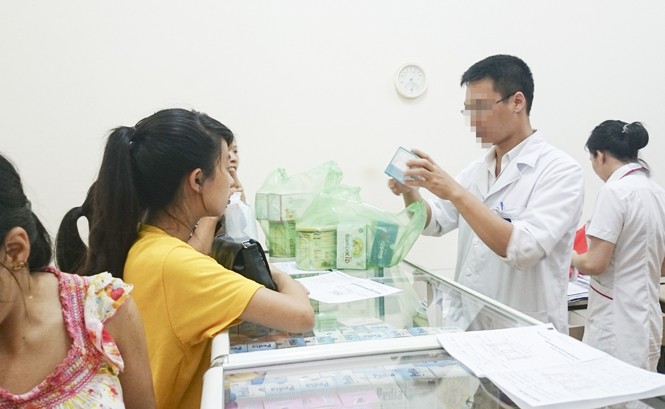Most older generation antibiotics are ineffective.
Professor Dr. Nguyen Viet Tien, Deputy Minister of Health, warned that most of the old generation antibiotics today do not have specific effects. Most hospitals have to use new generation antibiotics in treatment.
 |
| Many people have the habit of buying antibiotics without a doctor's prescription. Illustration photo: Nhu Y. |
At the launching ceremony of the Global Antibiotic Resistance Awareness Week (November 13-19), which took place on the morning of November 13, Prof. Dr. Nguyen Viet Tien, Deputy Minister of Health, warned that most of the old generation antibiotics today do not have specific effects. Most hospitals have to use new generation antibiotics in treatment.
Experts warn that because research on new antibiotics is difficult, costly and time-consuming, antibiotic resistance will be extremely dangerous for patients with severe infections in intensive care and treatment units, because there is no specific treatment.
While developed countries are still using first generation antibiotics, Vietnam has used third and fourth generation antibiotics. More worryingly, Vietnam has seen the emergence of several types of super bacteria that are resistant to all antibiotics.
The Ministry of Health's leaders admitted that antibiotic resistance in Vietnam is becoming increasingly serious due to the widespread, prolonged use of antibiotics, abuse in livestock, poultry, aquaculture and crop farming, and especially the habit of buying antibiotics without prescriptions by a segment of the population.
To solve this problem, the Ministry of Health requires hospitals to prescribe drugs in accordance with the indications, regulations, and rules for inpatient and outpatient prescriptions issued by the Ministry of Health.
The institutes also formed a Pharmacy and Drug Council, which weekly reviewed the medical records and prescriptions given by doctors to patients to see if they were appropriate. In the near future, the Ministry of Health will pilot surveillance using a camera system at pharmacies and include the criteria for selling antibiotics by prescription in the standards for pharmacies that meet Good Pharmacy Practice (GPP).
Increasing number of patients dying due to drug resistance
At the workshop, experts said that around the world, many common infectious diseases are becoming increasingly resistant to the antibiotics used to treat them, leading to longer illness and more deaths. Infectious diseases such as pneumonia as well as HIV, tuberculosis and malaria are becoming increasingly untreatable due to drug resistance.
Mr. Kidong Park, Chief Representative of the World Health Organization (WHO) in Vietnam, said that according to statistics, if antibiotic abuse continues unchecked, the number of patients dying from drug resistance will increase from 700,000 people per year now to tens of millions by 2050.
| Mr. Kidong Park, Chief Representative of the World Health Organization (WHO) in Vietnam, said that according to statistics, if antibiotic abuse continues unchecked, the number of patients dying from drug resistance will increase from 700,000 people per year now to tens of millions by 2050. People can die just from a cut bleeding due to wound infection that antibiotics do not respond to. Along with that, antibiotic abuse increases the risk of unwanted adverse drug events such as allergies, anaphylactic shock, gastrointestinal bleeding, etc. |
People can die from just a cut bleeding due to wound infection that antibiotics do not respond to. Along with that, the abuse of antibiotics increases the harmful side effects of unnecessary drugs such as allergies, anaphylactic shock, gastrointestinal bleeding... These lead to increased hospitalization rates, deaths and increased economic burden for the patient's family and for the whole society.
Mr. Luong Ngoc Khue, Director of the Department of Medical Examination and Treatment (Ministry of Health) said that the Ministry of Health has issued a Plan to implement the Project to strengthen the control of drug prescription and sale of prescription drugs in the period of 2017-2020 with the goal of reviewing and amending legal regulations related to drug prescription and sale of prescription drugs.
At the same time, increase the rate of compliance with the law on prescriptions in outpatient treatment, especially tightening the requirement to purchase antibiotics with a doctor's prescription. Accordingly, in the 2017-2018 period, the Ministry of Health will coordinate with the Department of Health to implement the Project in the provinces and cities of Nam Dinh, Vinh Phuc, Da Nang and Can Tho. Phase 2 from 2018 to 2020 will expand nationwide. By 2020, 100% of pharmacies and drugstores selling antibiotics will be required to have a prescription.
Deputy Minister Nguyen Viet Tien said that he will ask the Drug Administration to conduct a pilot program to monitor the sale of prescription drugs in some places, especially big cities. At the same time, he will strengthen infection control at medical facilities, tighten anti-infection work in post-operative areas, wash hands with soap, etc.
According to TPO
| RELATED NEWS |
|---|
